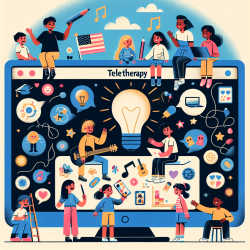Bridging Gaps in Autism Services: Insights from Community-Based Trials
As a speech-language pathologist, you are committed to delivering the best outcomes for children with Autism Spectrum Disorder (ASD). However, disparities in service access and quality remain a significant challenge, especially in low-resource settings. A recent study, "Utilizing Community-Based Implementation Trials to Advance Understanding of Service Disparities in Autism Spectrum Disorder," provides valuable insights that can help you improve your practice and advocate for systemic changes.
Understanding the Research
The TEAMS (Translating Evidence-based Interventions for ASD: Multi-Level Implementation Strategy) project is a large-scale, multisite trial that aims to improve the quality of care for children with ASD by focusing on implementation leadership, organizational climate, and provider attitudes. This project includes two coordinated studies that test the effectiveness of the TEAMS Leadership Institute and TEAMS Individualized Provider Strategies for training (TIPS).
Key outcomes targeted by the TEAMS project include:
- Provider training completion
- Intervention fidelity
- Subsequent child outcomes
Addressing Service Disparities
The study highlights significant disparities in access to and quality of care for minority children with ASD. For example, Latinx children are less likely to receive high-quality, evidence-based care compared to non-Latinx white children. Factors such as cultural differences, language barriers, and lower levels of mental health literacy contribute to these disparities.
To address these issues, the TEAMS project has developed enhancements to existing interventions like AIM HI (An Individualized Mental Health Intervention for ASD) and CPRT (Classroom Pivotal Response Teaching). These enhancements focus on improving parent understanding of ASD, building trust between parents and clinicians, and adapting interventions to be culturally sensitive.
Practical Applications for Practitioners
Here are some practical steps you can take to implement the findings from this research:
- Enhance Parent Education: Provide comprehensive psychoeducation about ASD to parents, particularly those from minority backgrounds. This can help bridge gaps in understanding and improve engagement in their child's treatment.
- Build Trusting Relationships: Focus on establishing a relationship of trust and safety with parents. This is crucial for encouraging active participation in their child's therapy.
- Adapt Interventions: Be flexible and willing to adapt your interventions to meet the cultural and linguistic needs of the families you serve.
- Focus on Implementation Fidelity: Ensure that your interventions are delivered with high fidelity to maximize their effectiveness. This may involve additional training and support for yourself and your team.
Encouraging Further Research
While the TEAMS project provides a strong foundation, ongoing research is essential to continue improving outcomes for children with ASD. Consider participating in or supporting further studies that focus on:
- Identifying additional barriers to high-quality care in diverse communities
- Developing new strategies for engaging minority families in ASD interventions
- Evaluating the long-term impact of culturally adapted interventions
By staying informed and involved in research, you can contribute to the ongoing effort to reduce disparities and improve the quality of care for all children with ASD.
To read the original research paper, please follow this link: Utilizing Community-Based Implementation Trials to Advance Understanding of Service Disparities in Autism Spectrum Disorder.










